This is the newsletter version of Sara by the Season, where I explore a little bit of everything that’s on my mind as I try to lean into nature’s wisdom and rhythms. You can listen to me read you the newsletter by hitting play above - or you can click the little link above and to the right to play in your favorite podcast player. If you know someone who would like this sort of thing, I’d be so grateful if you would share it!
I listened to the Ezra Klein podcast episode on Sabbath, which I highly recommend. In it, he interviewed Judith Shulevitz, who wrote The Sabbath World, in which she explores the Jewish and Christian history of the Sabbath. Klein sees the value in a Sabbath practice and really wants to incorporate some kind of sabbath into his life, but he tells Shulevitz repeatedly how difficult he finds it to consistently practice.
Shulevitz’s response isn’t some five step practice of how to do Sabbath; instead, she basically says that you can’t truly practice Sabbath unless you join some kind of counter-cultural community. True Sabbath requires a community — and community buy-in and accountability. She references the blue laws that were in place in much of the US, especially the South, until very recently. I went to college in South Carolina, and I noticed how many more stores and restaurants were open on Sunday mornings even between my freshman and senior years (20 years ago).
Shulevitz said that one of the most influential thinkers about Sabbath was Felix Frankfurter, a Jewish Supreme Court Justice, who argued in favor of the American (Christian) Sabbath in McGowan v. Maryland, a famous 1961 case that upheld Sunday closing laws against a First Amendment challenge. According to Shulevitz:
Frankfurter wrote a concurring decision, which is really one of the great Sabbatarian texts in my opinion. And he talked about Sunday and Sunday quietness on the streets, near the stores. He talked about it as a cultural asset of importance, a release from the daily grind, a preserve of mental peace, an opportunity for self-disposition. And he was saying this because he wanted to make the argument that it may have started as a religious institution, but it became a civic institution and it made our civitas a better society.
Frankfurter, a Jew, saw the cultural and societal benefits of what started as the Christian Sabbath, even if it didn’t coincide with his own beliefs and practices. What a concept.
Our clan from Seminary of the Wild meets once a month to catch up and discuss seasonal topics and practices. We met a few weeks ago to talk about ritual. Together, we (all women) grieved the craziness and pressure of December. We talked about why November through December, at least in America, get to have all the fun. Historically, celebrations and “holy” (literally, set apart) days stretched throughout the year, as if our earliest ancestors recognized the need for us to gather together for revelry and connection at many times throughout the year.
In our family, we’ve been trying to live in this more seasonal way for over a decade at least - celebrating Samhain and Imbolc, the solstices, certain feast days according to the church calendar. Some years are better than others, and even when I do manage to prepare properly for whatever day we’re trying to celebrate, I find myself grieving at how difficult it is to go it alone. Back when these celebrations were carried by the community, one person wouldn’t have had to do all of the heavy lifting on their own. There would have been community-wide preparation of some sort - determining who would do what, who would bring what, and where it all would be.
I don’t want to romanticize the past. There were surely plenty of problems and inequity about how the labor for all of these celebrations was distributed, but I also feel the weight of trying to carry the deep desire to live in this way more in tune with nature mostly by myself.
How Shulevitz responded to Klein’s guilt around Sabbath-keeping felt like a bit of a permission slip for living seasonally too. If you want to keep the Sabbath, you need a community that will develop and agree on the rules of Sabbath-keeping, so that if you close your store on the Sabbath, the other business owners do too. You need others to be accountable to and to hold you accountable. You need support for the preparation necessary to pull off an actual Sabbath.
In the same way, living more aligned with nature requires similar support, preparation, and accountability. It is very difficult to live in these counter-cultural ways as individuals or as a family here or there. It doesn’t mean that it isn’t worth trying, but Shulevitz seemed to be telling us that you have to accept how hard it is to do much of anything meaningful in this hyper-individualized culture.
If you ask me, that’s both a little freeing and a little depressing.
Scattering Seeds
I’m always finding stuff that supports the thesis of the book I’m writing on the benefits of leaning into nature’s wisdom, so I thought I could start sharing those links and things here with all of you in hopes of some of the seeds I share germinating into something beautiful at your place.
This letter made me a little sad to be honest, but it’s worth reading in the ever-elusive work/life balance genre. I loved this bit: “artists [and we’re all artists - SS] are always working, though they may not seem as if they are. They are like plants growing in winter. You can’t see the fruit, but it is taking root below the earth.”
On the seasonality of family life - and how liberating it is to recognize it.
Nick Cave is always worth reading, but I keep coming back to this letter. He says in response to the person who wrote in feeling like nothing they do matters: “you must come to terms with the fact that as a human being you are infinitely powerful, and take responsibility for this tremendous power. Even our smallest actions have potential for great change, positively or negatively, and the way in which we all conduct ourselves within the world means something.” If you’re doing some winter reflection as the season calls for, do some reflecting on that!
Mary’s Imbolc poem - perfect for Imbolc and this threshold season.
Cheers to figuring what support you need in the areas you need it,
Sara

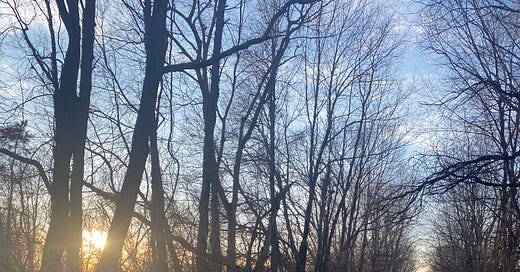
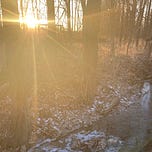



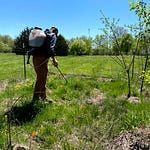
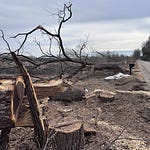



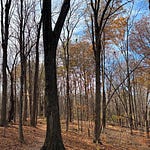


Share this post